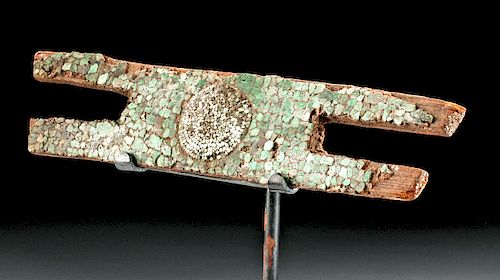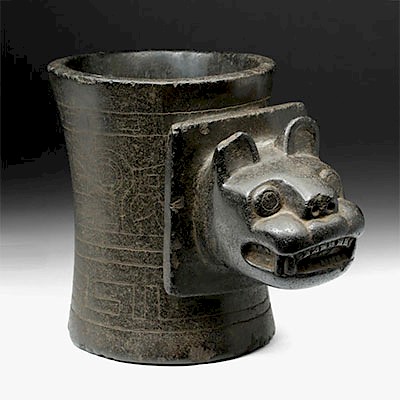Aztec Wood & Turquoise Pendant Representing Xiutecuhtli
Lot 14c
About Seller
Artemis Fine Arts
686 S Taylor Ave, Ste 106
Louisville, CO 80027
United States
Selling antiquities, ancient and ethnographic art online since 1993, Artemis Gallery specializes in Classical Antiquities (Egyptian, Greek, Roman, Near Eastern), Asian, Pre-Columbian, African / Tribal / Oceanographic art. Our extensive inventory includes pottery, stone, metal, wood, glass and textil...Read more
Estimate:
$12,000 - $15,000
Absentee vs Live bid
Two ways to bid:
- Leave a max absentee bid and the platform will bid on your behalf up to your maximum bid during the live auction.
- Bid live during the auction and your bids will be submitted real-time to the auctioneer.
Bid Increments
| Price | Bid Increment |
|---|---|
| $0 | $25 |
| $300 | $50 |
| $1,000 | $100 |
| $2,000 | $250 |
| $5,000 | $500 |
| $10,000 | $1,000 |
| $20,000 | $2,500 |
| $50,000 | $5,000 |
| $100,000 | $10,000 |
| $200,000 | $20,000 |
About Auction
By Artemis Fine Arts
Oct 3, 2019
Set Reminder
2019-10-03 10:00:00
2019-10-03 10:00:00
America/New_York
Bidsquare
Bidsquare : Exceptional Day 2: Pre-Columbian & Tribal Art
https://www.bidsquare.com/auctions/artemis-gallery/exceptional-day-2-pre-columbian-tribal-art-4453
Day 2 of an important 2-day auction featuring exceptional, museum-worthy examples of Pre-Columbian from the ancient Americas, Native American, African / Tribal, Oceanic, Spanish Colonial and fossils. Artemis Fine Arts info@artemisgallery.com
Day 2 of an important 2-day auction featuring exceptional, museum-worthy examples of Pre-Columbian from the ancient Americas, Native American, African / Tribal, Oceanic, Spanish Colonial and fossils. Artemis Fine Arts info@artemisgallery.com
- Lot Description
Pre-Columbian, Mexico, Aztec Empire, ca. 1400 to 1521 CE. Wow! An incredibly preserved, extremely rare symmetrical cedro wood pendant with turquoise applied in a mosaic style over a thin layer of pine resin and copal. At the center is a slightly raised circle with incredibly tiny turquoise mosaic tiles. The shape of the wooden pendant is rectangular, with deep grooves excavated from the shorter sides. The round circle at the center resembles an eye. The wood is perforated vertically at the edges of the grooves and would have been strung for suspension as a pendant or pectoral. The artwork represents an Aztec Lord as Xiuhtecuhtli, the god known as both the "Lord of Fire" and "Turquoise Lord". Turquoise was the symbolic equivalent of fire for the Aztecs, and every Aztec home kept a permanent fire in honor of Xiuhtecuhtli. Size: 7.6" W x 1.65" H (19.3 cm x 4.2 cm); 5.9" H (15 cm) on included custom stand.
This symmetrical turquoise mosaic pendant is instantly recognizable as being in the same style as the famous double serpent pendant held by the British Museum (https://www.britishmuseum.org/research/collection_online/collection_object_details.aspx?objectId=663692&partId=1&searchText=double-headed-serpent&page=1). Similar large effigies of gods worn as pectorals are illustrated in folio 72 of the Codex Magliabechiano depicting the earth goddess Cihuacoatl, and in folios 9, 10, and 34 of the Codex Borbonicus. Larger turquoise mosaics graced important spaces, like the Templo Mayor in Tenochtitlan.
Provenance: private Hawaii, USA collection; ex-Stuart and Scott Gentling collection, Dallas, Texas, USA. Scott Gentling painted the official gubernatorial portrait of George W. Bush for the Texas Capital.
All items legal to buy/sell under U.S. Statute covering cultural patrimony Code 2600, CHAPTER 14, and are guaranteed to be as described or your money back.
A Certificate of Authenticity will accompany all winning bids.
We ship worldwide and handle all shipping in-house for your convenience.
#148449Intact, with no restoration. Some of the turquoise is lost as shown. Light deposits and patina on surface.Condition
- Shipping Info
-
All shipping is handled in-house for your convenience. Your invoice from Artemis Gallery will include shipping calculation instructions. If in doubt, please inquire BEFORE bidding for estimated shipping costs for individual items.
-
- Buyer's Premium



 EUR
EUR CAD
CAD AUD
AUD GBP
GBP MXN
MXN HKD
HKD CNY
CNY MYR
MYR SEK
SEK SGD
SGD CHF
CHF THB
THB














